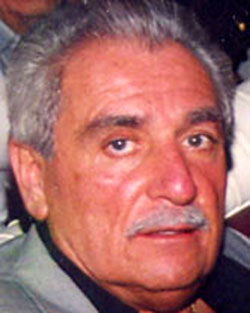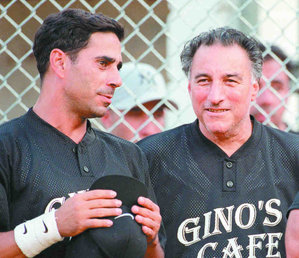Niagara Falls mobster dies at 73

“That’s the end of an era in the Falls, that’s for sure… Everyone is devastated… I was sad because he had been there for me during my time in prison, and helped a ton with hooking me up with the right guys…Guys all around the country that knew him are shocked, but life goes on…”
With those words, a convicted Niagara Falls racketeer and former federal inmate who spoke on the condition of anonymity described reaction to the death of Benjamin “Sonny” Nicoletti Jr., 73, named by federal law enforcement officials as the head of organized crime in this city and the man in charge of illegal gambling and loan sharking in Western New York, and beyond, for the last 40 years.
Sonny or “Mr. Nick,” as he was often referred to locally, died last week of complications from a stroke. He had been in ill-health for the better part of a year, and sources close to the family told the Niagara Falls Reporter that he’d been in a coma for a week prior to his Sept. 3 passing.
Like his mentor, Stefano Magaddino, old age and bad health combined to lay Nicoletti low where generations of underworld enemies and law enforcement types had failed.
“The consensus is, he's not suffering any more,” said one Pine Avenue businessman. “I’m still shocked because he’s been around a long time and it doesn't seem real. Now you have a few old-timers left in Buffalo, but it seems we won’t see his likes again.”
Sonny Nicoletti was born into the life. His father, Benjamin Nicoletti Sr., was a top man in the old Magaddino mob here and his cousin, Joseph Nicoletti of Brooklyn , was a so-called "made man" in Brooklyn’s Bonnano family.
Sonny was frequently arrested, but rarely convicted and, even when he was convicted, barely served any time. "When they gave out the name, 'Teflon Don,' they should've gave it to Sonny instead of Gotti," said one old- timer.
His first serious arrest came on the afternoon of Nov. 26, 1968, when – along with his father and Peter Magaddino, Sam Pugelese, Gino Monaco, Pasquale “Patsy” Passaro, Augustine Rizzo, Louis Tavano and Michael Farella – he became a part of the infamous “Niagara Falls Nine,”charged by federal authorities along with Don Stefano Magaddino with conspiracy and violation of the Interstate Transportation in Aid of Racketeering Act.
The feds wasted no time before crowing to the newspaper hacks that they had “broken the back” of organized crime in Western New York.
But the euphoria was short-lived. Federal charges against Magaddino and the rest of the Nine were dropped because the feds refused to name one of their informants in the case and they had used illegal wire taps.
The following year, Sonny was picked up along with his father in North Tonawanda, where they were running the Varsity Restaurant and the Oliver Social Club as fronts for an illegal gambling operation. Again, cops and a local judge screwed up the search warrant, and all charges were dropped for lack of evidence.
By 1970, Sonny was running a little casino at the old Ivanhoe Inn on Buffalo Avenue. Niagara Falls police, with nothing better to do, busted the joint. Police surveillance of the saloon showed it was frequented by known gamblers, and informants reported that gambling operations were being conducted there. Based on this information, an eavesdropping warrant was secured to tap a telephone in a room at the inn believed to be used in the gambling operation.
Numerous incriminating conversations were intercepted, according to police. The defendants were then arrested, and indictments followed.
The entire case was thrown out on appeal when it was shown that the tapes had been taken home by cops, who spliced and edited them to create a “greatest hits” package.
Following Stefano Magaddino’s death in 1974, the feds arrested acting boss Joseph Todaro, Russell Buffalino of the northeastern Pennsylvania Buffalino family, racketeer Frank Valenti and Sonny Nicoletti, who had been promoted and was in control of gambling operations for the Buffalo mob. The Feds failed to prove their case and Sonny walked away a free man.
During the 1980s, Buffalo-based federal agents again arrested him, locating voluminous records concerning loan sharking, bookmaking, and infiltration of legitimate businesses. Again Sonny walked.
While he had been arrested for gambling activity on more than a dozen occasions, Nicoletti was remarkably successful in avoiding prison time, serving just a year in jail following a plea agreement in 1993.
Still the feds dogged him.
On Sept.12, 2002, Nickoletti was arrest on federal charges of racketeering, conspiracy and extortion. Arrested with Nicoletti was Adam Thomas, a former banker from St.Catharines, Ont.,who has been associated with Nicoletti since 1996 when authorities say they created a new type of gambling racket.
Nicoletti and Thomas set up a 1-800 betting service based in the Dominican Republic, where gambling is legal. What was not legal, authorities say, was sending thugs to the homes of bettors in the United States who were slow in paying.
One of these, Willie Tyrone Crittendon, was found guilty of perjury after he denied assaulting a deadbeat gambler on Nicoletti's behalf.
At the time, Sonny was named by federal law enforcement authorities as the head of the Niagara Falls "crew" of the Buffalo organized crime family, known nationally in underworld circles as "The Arm." Federal officials said Nicoletti controlled illegal gambling throughout Western New York and Southern Ontario, a charge denied by Nicoletti and his attorney, Joel L. Daniels.
"This is ancient history," Daniels said at the time. "We'll take it to trial."
Sonny got probation. Daniels doesn’t earn the big bucks for nothing.
In 2004, Sonny was convicted of violating federal weapons charges for having a couple of high-priced shotguns in his home and whisked off to jail. The Italian pigeon guns were pieces, made by Bernadelli and Beretta - but that didn’t stop law enforcement and a federal jury agreed that possessing the shotguns found in his home during a probation department inspection constituted another felony.
There was never a newspaper story about Sonny’s philanthropic work with the no-kill Northtowns Animal Shelter, or any of his other efforts to save dogs, cats, horses and other animals victimized by human beings. There were no stories because Sonny didn’t want any.
And the boilerplate is this; Survivors include his beloved wife, Marguerite M. (Trasatti) Nicoletti; children Debra A. (Edward) Macri of Sanborn, Benjamin J. Nicoletti (Linda Folino) of Lewiston, Anthony Nicoletti (Beth Lauzonis) of Niagara Falls, Ronald J. (Lisa) Nicoletti of Lewiston; grandkids Dominic Macri, Nicholas Harvey, Alexa Nicoletti, Olivia Nicoletti and Marco Nicoletti; sibling of the late Paula (Ben) Cafaro of Las Vegas, Nevada, Mario Nicoletti, Jennifer Nicoletti, both of Florida, and special friends and confidants Adam Thomas of Niagara Falls, Ont., and Tim Shiah of Las Vegas.
As Nino might have said, “Cosa si puo dire?”
http://www.niagarafallsreporter.com/Stories/2012/Sep11/BenjaminNicoletti.html































